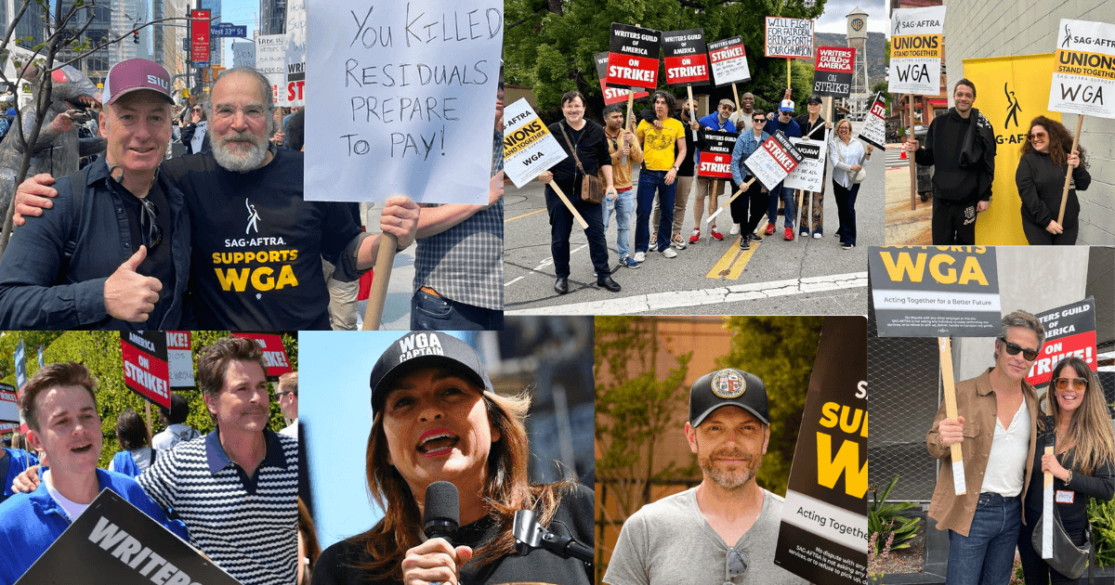Screen Actors Authorize Strike While Directors Move Closer to a Deal

On Monday night, the Screen Actors Guild – American Federation of Television and Radio Artists (SAG-AFTRA) announced that membership overwhelmingly voted to authorize a strike. The vote comes as the Writers Guild of America (WGA) is on strike and just days after the Directors Guild of America (DGA) reached an agreement with the studios (via the Alliance of Motion Picture and Television Producers or AMPTP) for a new contract.
Where does this leave TV and film productions? In a very precarious place. The writers are still on strike, and by the end of June, actors could officially join them on the picket lines. That would mean there’s no moving forward for scripted projects under the guild rules, and we could see a full stop to multiple global productions.
Looking for the hottest entertainment?
Subscribe to our email newsletter to get the latest TV premieres, entertaining takes, and money-saving promotions.
By signing up, you agree to our Privacy Policy & Terms and Conditions.
Of course, there is hope. The DGA reached a tentative deal with the AMPTP, but it still needs to be approved by the board and ratified by the guild members. However, members have expressed concerns and could reject the deal.
On June 7, SAG-AFTRA begins negotiations with the AMPTP and has to reach a deal, or else the actors strike. Both SAG-AFTRA and DGA contracts will expire on June 30. The Writers Guild’s contract expired on May 1, and writers have been on strike ever since.
What are actors fighting for?
According to SAG-AFTRA’s strike FAQs, the guild is focused on “economic fairness, residuals, regulating the use of artificial intelligence and alleviating the burdens of the industry-wide shift to self-taping” in their upcoming negotiations with the AMPTP.
Actors are aligned with writers on many critical issues like compensation and the threat of AI. SAG-AFTRA highlighted main points, including:
- Economic Fairness to ensure members can make a living in “scripted dramatic live action entertainment.”
- Residual payments that reflect the economic value of actors’ contributions to the project.
- AI acceptable use agreement, including consent and fair compensation for work that uses “members’ voices, likeness, and performances.”
- Self-Tapes are regulated to ensure fair access and not to be a burden to performers.
Actors have not gone on strike against the major studios since 1980, when they protested residuals over videotape and cable TV. Now, streaming is set to make its mark.
An actors’ strike would make it impossible to film scripted programming, shutting down all productions from major U.S. studios. (Already, we’ve seen film productions shut down because of the threat of a strike.)
Although the DGA reached a tentative deal covering AI and residuals, SAG-AFTRA and the WGA have said their concerns differ and require wholly separate agreements. This could lead to issues with negotiations and may stall ending strikes since there isn’t a one-size-fits-all agreement.
How would an actors’ strike impact your viewing?
While the guild represents screen actors, broadcast journalists, announcers, hosts, and stunt performers—over 160,000 people total—only members in film and television productions would be part of a strike.
The strike will not impact news and broadcast shows, but all the shows that haven’t shut down yet will probably shut down on July 1 following a strike. Actors will also not be allowed to promote projects, disrupting marketing opportunities for studio movies and shows this summer.
Shows already delayed will face longer delays since actors cannot be on set while striking. That means new seasons of Law & Order: SVU and Abbott Elementary will be put on hold.





